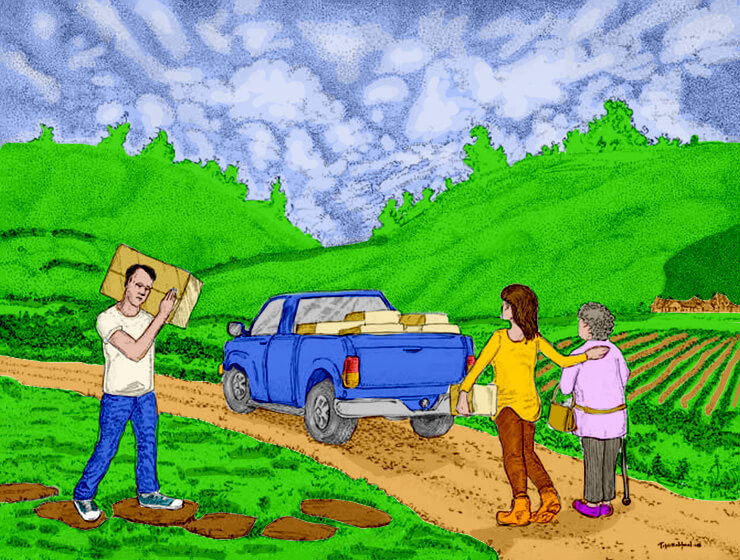Read by Matilda Longbottom

Farming has shown me that when surrounded by the absolute worst of conditions, both people and plants will work hard to survive. When our part of California was struck by the disastrous firestorms in October, the lesson took on a whole new meaning.
After the first night of that terrible conflagration, the power at our ranch went off. We lost Internet connection, and our cell phone reception became erratic. I dug up an old AM/FM battery radio so we could find out what was going on around us.
The fire status updates made it clear that we—my husband, his mother, and I—might soon need to evacuate, so we packed our car and pickup truck. My husband, Zack, is the best packer I know. With the back seats of the car folded flat and a canopy over the bed of the truck, it was surprising how much we could carry.
As always, important papers and family records came first. We loaded up two large metal file boxes for our documents and two more for my mother-in-law’s. Next came photos, then some family keepsakes, and last, music for Zack and books for me.
These days Zack keeps his music on his iPod, unlike during a fire we fled in the early eighties when we hauled out his complete collection of Jethro Tull LPs. That time a sheriff’s deputy banged on our door at 4:00 a.m. yelling that we had 15 minutes to leave.
This time we had more warning. Still, neither of us gave a thought to bringing what we have come to
call “just stuff.”
Since there were already tens of thousands of evacuees in our five-county area, we also packed camping equipment. We knew that, for Zack’s mother, an emergency shelter would be a last resort: People with Alzheimer’s find that strange places, especially crowded places, cause disorientation, fear,
and panic. We thought if nothing else, we could find a campsite, even if it was just a wide spot by the road.
We spent the next several anxious days and nights on evacuation alert. Fortunately, though, we never had to leave our ranch.
Once the fires were under control, we had two weeks of smoky skies and muggy temperatures. Our tomato vines, though, refused to give up. They had more than enough fruits for us to eat and sell.
The tomatoes kept growing even after high winds knocked down their loaded cages. I couldn’t let those gorgeous golden Oxhearts, the striped Japanese Blacks, or our sweet Pine Mountain cherries go to waste. So, foolish as I felt, I got down on my hands and knees and crawled under the cages to reach the ripe ones.
After washing and sorting tomatoes on Tuesday and Saturday mornings, I would drive to town for my regular deliveries. We deliver door to door, to both restaurants and individuals. Some of our folks have been with us from the beginning, nine years ago. But as I made my way from one place to another, I saw a lot of folks I didn’t know, many of them evacuees.
I instinctively struck up conversations to see how they were doing. Often in a crisis our normal stand-off defenses are down. Conversations with strangers seemed to flow naturally, as if we’d known each other for years.
Soon signs started appearing around town. “Thank You, First Responders!” “The Love In The Air Is Stronger Than Smoke.” “Sonoma Strong.” And “Community Strong.” I especially liked that one—Community Strong.
In her book A Paradise Built in Hell, Rebecca Solnit tells of disasters ranging from the 1906 San Francisco earthquake to Hurricane Katrina in New Orleans. People fought and suffered to survive, but also found strength and solidarity. Solnit says that people have a “yearning for community, purposefulness, and meaningful work that disaster often provides.”
Perhaps there’s a way to capture that yearning and apply it to our ordinary days, not just the times that are fraught with danger and loss. One thing farming has shown me is that when you see a community coming to life, often food is at the center.
I saw the proof of that at the diner that features our heirloom tomatoes. People sheltered at the local fairgrounds or nearby RV parks gathered at eateries. New friendships sprang up and people who were strangers only days before shared sympathetic hugs.
Our fire danger is over for now. This morning, Zack, his mother, and I were walking through the garden when I noticed a few withered plants. A large potato and several smaller ones were just visible in the dirt. I dug these unexpected gifts out of the warm, moist soil by hand.
An old farmer once told me, “You don’t git nothin’ for free in farmin’. You gotta work for every bit.” But that’s not completely true. Farming is hard work, but there are gifts nearly every day. Some of them come from the plants. But others come from the people those plants bring you in contact with.
Like I said, people and plants will work hard to survive. But people do it best if they do it together. ❖


 Previous
Previous

